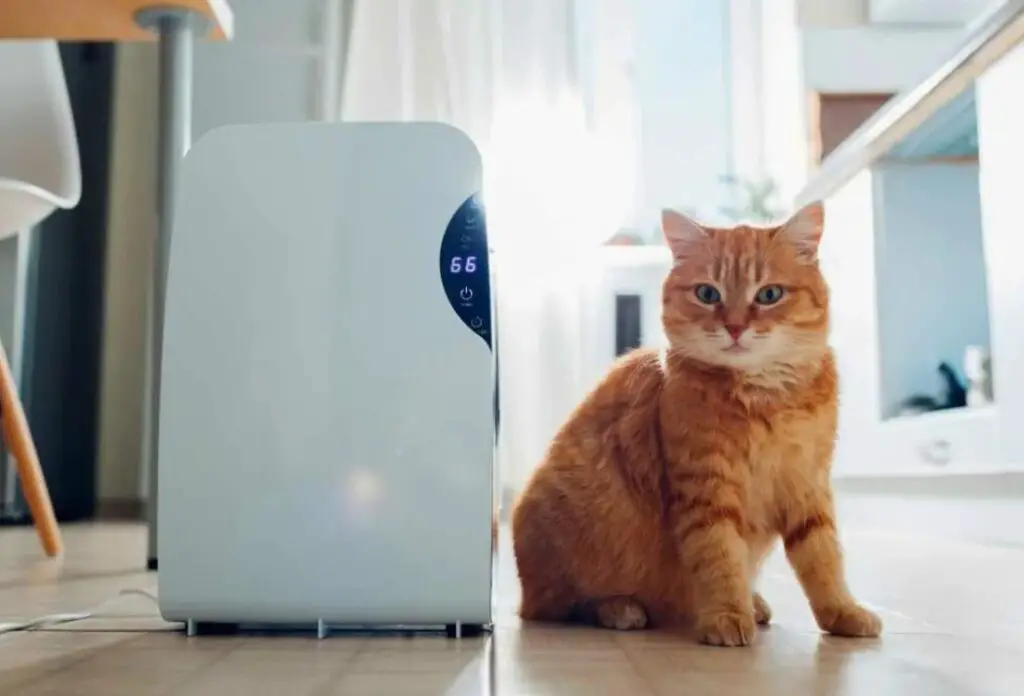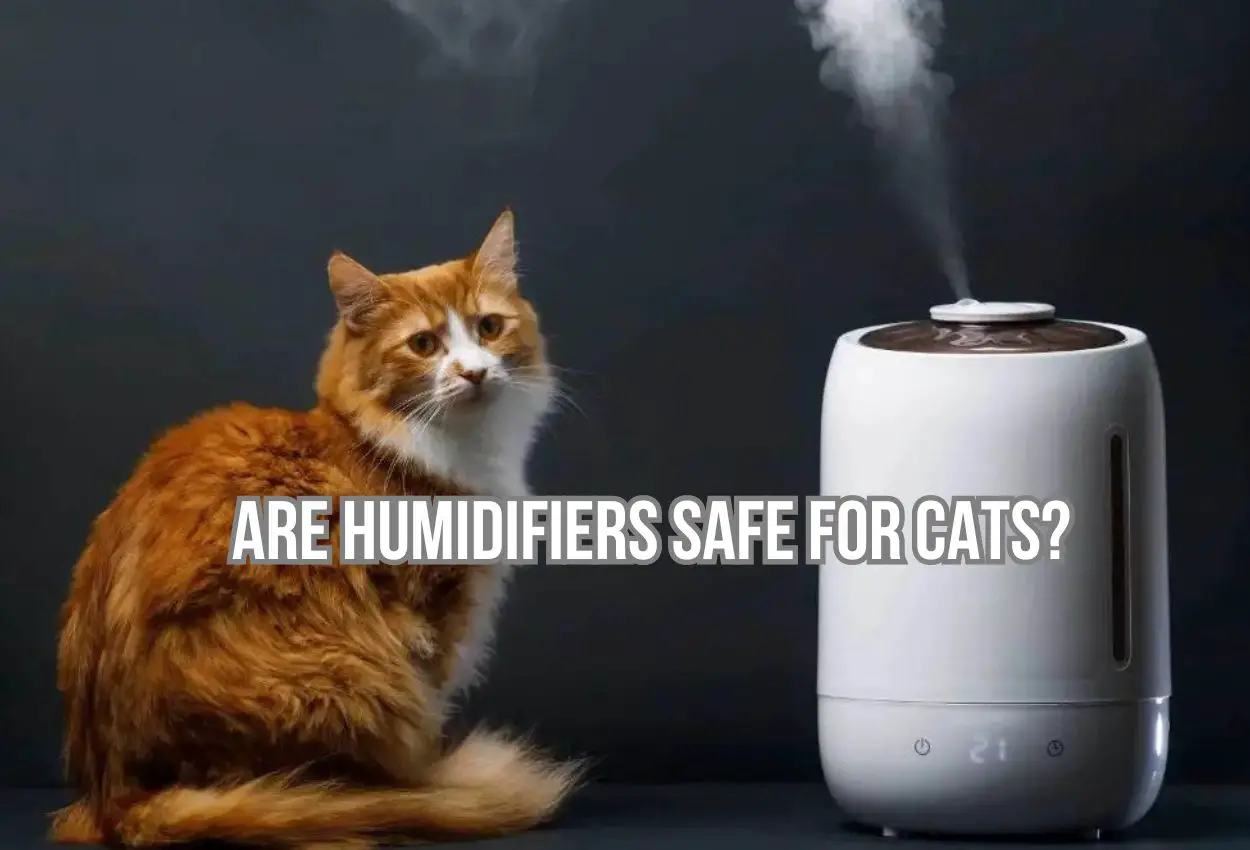Are humidifiers safe for cats? Humidifiers are super handy devices that you can find in many American homes. They are the best option for those living in dry regions to moisten dry air in their home.
But are humidifiers safe for cats? Since we love our furry friends, a question of humidifier safety is actually for the cat owners.
In this article, we will find out more about cats and humidifiers sharing the room!
Table of Contents

Are humidifiers safe for cats and other pets?
The answer is “yes”! As humidifiers help to increase the relative humidity in your home, they are good for your pets. Can’t you breathe easier with a humidifier on? The same is for your cats!
How does a humidifier work?
This useful device keeps your dry air hydrated. This process alters the humidity and temperature in your room.
Generally, humidifiers use a wicking filter that absorbs distilled water from the basin. A fan blows air through the filter, which is already moistened.
Humidifier releases cool or warm mist into your room.
However, every humidifier is a power device. A combination of water and electricity sounds dangerous. That is the first reason for a cat owner to worry about.
Let’s look in detail and answer the most important questions: Are humidifiers safe for cats? How do they affect a cat’s health? What are the pros and cons of humidifiers when talking about cats?
Are humidifiers harmful to pets?
You may already guess that humidifiers have a bunch of benefits, both for you and your pets. However, there are two essential drawbacks to keep in mind.
Don’t create an excessively humid environment in your home. An extra-humid area is a great breeding ground for mold and mildew, and many harmful bacteria. All these are dangerous, both for you and for your furry friends.
Remember that some devices are not safe for cats. Since warm mist humidifiers use a heating system, they create a steam of mist by boiling water inside. Make sure that your humidifier is not one of them.
Cats are innately curious creatures. They enjoy spending time exploring everything new and mysterious. So, a humidifier is definitely attractive for them.
The device vibrations can easily attract a curious cat. Getting too close to the working humidifier, your feline friend can get a burn injury.
Can pets be around humidifiers?
The best idea is to keep a humidifier away from your pets’ reach. Even cool mist or ultrasonic humidifiers are electric devices that can cause accidents, so take care of your furry friend.

Are humidifiers good for cats’ health?
Just like humans, cats like to live in a comfortably humid environment. The optimal humidity level for cats is about 30% to 50%.
If you live in a region with a humidity level of below 30%, especially in the winter months, you need a humidifier to enhance the air quality.
A humidifier can improve the cat’s breathing, especially for those cats who suffer from feline asthma.
Moreover, the optimal humidity levels are good for the cat’s skin and fur coat. Cats who have dry skin feel itchy, so they need to groom much more often to soothe and moisten their bodies. Cool mist humidifiers can relieve these nasty issues.
Can a humidifier help a cat breathe?
Generally, cats are prone to different respiratory infections, especially in cold weather. They often have cold symptoms, such as runny nose, nasal discharge, wheezing, coughing, and other types of breathing difficulties.
Since room humidifiers are good to relieve human respiratory conditions, it works the same for cats as well.
The optimal humidity in the air helps to moisten and unblock your kitty’s nasal passages. In general, optimally humid air is always much easier for breathing than drier one.
Can a humidifier relieve cat asthma attacks?
Feline asthma is a common disease for about 1% to 5% of cats. Like in human asthma, the symptoms get worse in drier air that triggers wheezing, constant coughing, and excessive mucus.
In fact, not only dry air is a cause of cat asthma. Such airborne allergens as molds, pollen, cigarette smoke, and litter dust can affect your kitty’s health conditions. Extreme stress is one more risk to affecting asthma issues.
If your cat suffers from cat’s asthma attacks or any other respiratory diseases, it is the best idea to keep your humidifier on constantly.
Feline asthma attacks can show such signs as difficulty breathing, rapid breathing, wheezing, persistent coughing, hacking, open-mouth breathing, and vomiting
The tiny water droplets in the air do their magic to relieve cat asthma symptoms.
I also recommend reading: Does a cool mist humidifier make the room cold

Will a humidifier help my cat’s stuffy nose?
Since upper respiratory infections are quite common for our fur babies, they need something to provide natural relief from the nasty symptoms.
Do humidifiers help cats with congestion? These magic devices are good to ease the runny and stuffy nose of your cat. Place one at home and monitor your cat’s symptoms for just a few days. The results will be surprising!
The congestion symptoms get worse in the dry and stale air. With the working evaporative humidifiers, the cat’s nasal passages will quickly relieve and feel much better.
As a result, it helps with your kitty’s runny nose and breathing difficulties, which improves overall health conditions.
I also recommend reading: How you can get cool air from one room to another?
Does humidity make cats sick?
As you can see, a humidifier is good for your kitty as it adds enough moisture to the air. However, is the excess humidity safe for cats?
When the humidity is too high, the saliva won’t evaporate quickly from the cat’s fur coat. It can increase the risks of catching a cold or getting a heat stroke.Control the optimal humidity in your cat’s environment to prevent heat exhaustion, heat stroke, and dehydration.
The next risk is to have mold in the too-humid air. Control the humidity levels to avoid this nasty issue, as it is bad both for you and your lovely fur ball.
A good rule of thumb is to use only distilled water in your humidifier. As tap water can have some harmful additives, the water vapor can cause allergic reactions.
I also recommend reading – How much electricity does an air purifier use in different conditions?

What is the best cat-friendly humidifier?
If you are looking for the best humidifier that will fit your kitty cat, there are certain points to consider.
Proper size: The smallest and the best-quality humidifiers are your best bet with a kitty at home. Since curious cats like investigating any interesting things, opt for a device that can’t harm them.
Sturdy and safe: Opt for a humidifier that is small, low, and wide to the ground. It lessens the risk of your cat knocking it over and getting burnt.
Low noise level: Cat’s ears are extremely sensitive, so they dislike too much noise around. Remember that too loud humidifiers can affect your pet’s ears and cause stress and distraction. Opt for an eco-friendly humidifier with a soothing cool mist and whisper-quiet operation.
As a variant, you can get an ultrasonic humidifier. As it uses high-frequency sound vibrations when converting water vapor and doesn’t have any risk of scalding, it is good for your cat as well.
Keep in mind that ultrasonic humidifiers have no filters and can cause some potential allergens to get into the air.
Programmable interface: In case you leave your kitty cat alone with a humidifier for some time, opt for a programmable humidifier. Create a flexible schedule that will fit your daily plans and protect your cat from accidents!
Hot or cold mist: If you are looking for the best cat’s humidifier, the right choice is quite evident!
Can cats have cold humidifiers? A cool mist humidifier is the best variant for a kitty at home. Cats are curious and playful, so a warm mist humidifier is more dangerous for them than a cool mist one.
In addition, cats are grooming their fur coat to clean, moisten and cool themselves. A cold mist humidifier can help them to soothe and get great heat relief. With a cool mist humidifier, the cat’s skin quality will improve a lot.
No essential oils: If you are planning to use some essential oils in your humidifier, forget about it! The compounds of essential oils are often poisonous to cats and can cause even more health issues.
Good filter: An installed filtering system in your humidifier is good both for your cat and for your time and money! So, an ultrasonic humidifier is not the best choice as it doesn’t have a filter.
I also recommend reading – Where to place an air purifier?

FAQ: Are humidifiers safe for cats?
Why does my cat love the humidifier?
The answer means both a natural curiosity and the health benefits for your cat. A humidifier not only looks attractive but also improves your cat’s skin and respiratory conditions. That’s why kitties like being around humidifiers so much.
Are essential oils safe for cats?
If you like adding some essential oils to the water tank, be aware of the risks for your kitties!
Most essential oils are toxic for cats. Cats’ sense of smell is 14 times greater than humans, so the smell of essential oils is at least overwhelming for them. Even a few drops of essential oils can cause skin allergies and respiratory issues.
Final thoughts: Are humidifiers safe for cats?
Are humidifiers safe for cats? As you can see, humidifiers are good for your kitty’s breathing, food intake, and coat quality. Opt for a cat-friendly humidifier and enjoy a happy, long life with your furry friend!
Read also: Are humidifiers bad for dogs?


